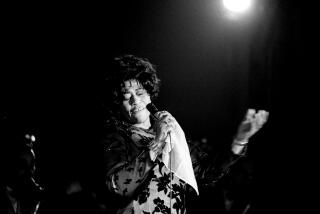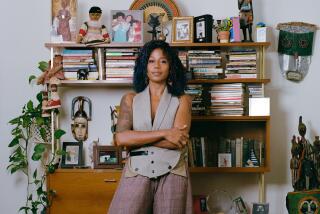BOOK REVIEW : Translating a Translator’s Life : THE THIRD KIND OF KNOWLEDGE Memoirs and Selected Writings by Robert Fitzgerald. Edited by Penelope Laurans Fitzgerald . New Directions:$24.95; 279 pages
- Share via
In a poem titled “History,” the late Robert Fitzgerald wrote of someone who “lived in rough Jehovah’s br/ And burned, a quiet wick in a wild night.”
*
Perhaps this recalled his turbulent and loving father, bedridden and gentled in his last dozen years. It certainly recalls Fitzgerald himself, a poet and translator whose most-remembered work was the fine English balance and bite he found for the primal storms of Homer, Virgil and Sophocles.
For two postwar generations of American readers, Fitzgerald, along with Richard Lattimore and Dudley Fitts, has been a wick that lit up the classics. Lattimore’s “Iliad,” Fitzgerald’s “Odyssey” (he also did an “Iliad” and an “Aeneid”) and the Fitzgerald-Fitts versions of Greek drama made it possible to pick up much of the vitality of the originals and, if not their poetry exactly, at least a poetry that the original detonated and restrained. “Translating Homer into English is no more possible than translating rhododendron into dogwood,” Fitzgerald once told an interviewer. “On the other hand, suppose you make dogwood?”
A translator has the mortality of the actor; the performance lasts a time, while the role goes on. This collection of Fitzgerald’s other writings prolong him. Edited and with a lucid and evocative prologue by his widow, Penelope Fitzgerald, the book also reflects the support of editors and writers who knew what a remarkable voice he had when he was not being Homer.
His postscripts to the translations of the “Odyssey” and the “Aeneid” are thoughtful modern reflections on the two epics. An essay comparing translations of Dante is a workshop on the translators’ stone--the one they roll uphill, like Sisyphus, and that rolls back down on them. Praising the transparency of one Dante translator, Fitzgerald writes: “He does not indulge in bright ideas that confuse everything.”
The most distinctive parts of the book are the autobiographical pieces and recollections of other writers. Fitzgerald’s style has occasional mannerisms. He visits not Crete but “the Crete”; he will write vividly of Harvard; of Henry Luce, for whom he worked; of Springfield, Ill., where he was raised, and will avoid naming them.
There is no concealment; perhaps it is a tropism toward timelessness. Penelope Fitzgerald notes that the death of his mother when he was 5, of his younger brother when he was 7, and of his father when he was 18 turned him to cultivate that part of the past that does not die. He believed, he once wrote, that “the human gifts of piety and sense of the past weigh somewhat in the balance against the universal fact of mortality.”
Names apart, Fitzgerald’s recollection of people, places and things glows as if he wanted to make their specificity endure: the morning sunlight in Pennsylvania Station after an all-night train trip; breakfast served by his Cambridge landlady; the library in the Springfield house where a stained-glass window panel cast on the carpet “a furry bar of purple and orange, a treasure without a body.”
His Springfield memories have a place with the most compelling childhoods in literature. The house belonged to his grandmother “a kind old woman who fussed” and who cared for the motherless child and widower father with tuberculosis of the hip. Fitzgerald remembers the illness as the gift of a companionship. He would wake his father in the morning, dress his wound on weekends, play cards with him in the evening and, until he was an adolescent, climb into bed for an hour of talk.
The account of his brief time as a reporter for the New York Herald-Tribune is a brilliant cameo of the city in the ‘30s and of its raffish newspaper, No. 2 in influence but No. 1 in elegance. There are vivid portraits of Flannery O’Connor, a close friend, and of Vachel Lindsay as a gallant, bypassed literary lion.
He writes of James Agee, his fellow worker in the Luce empire, first as a writer for Fortune, and later as Time magazine film critic. Their bond was close. Both were artists who felt frustrated by their paychecks. Fitzgerald speculates on what Agee achieved because of his journalistic work, and what he might have achieved without it. His conclusion is ambiguous, as it is when he speculates on the poetry he might have written had he not put his energies into translation.
It is a rich, lucid memoir and captures his mix of passion and stoic balance. Penelope Fitzgerald contributes a portrait of him teaching at Mt. Holyoke College: “Out the window over the distant hills of the Connecticut Valley that semester, the world turned increasingly leafy and green, and inside the classroom the pleasures that could be derived from a formal understanding of English prosody came magically to life before our eyes.”
When a student turned in a brilliant paper, Fitzgerald would scrawl NAAB (Not at all bad). By his standards, this collection would merit the same scrawl. By ours, it is more than a homage, it is a resurrection.
More to Read
Sign up for our Book Club newsletter
Get the latest news, events and more from the Los Angeles Times Book Club, and help us get L.A. reading and talking.
You may occasionally receive promotional content from the Los Angeles Times.










